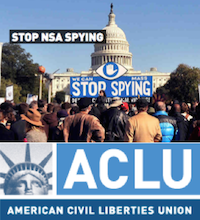 There will be a public lecture by Ashley Gorski on
There will be a public lecture by Ashley Gorski on
Litigating against Mass Surveillance in the US – The National Security Project at the American Civil Liberties Union
in the Swift Lecture Theatre, Room 2041A Arts Block, Trinity College Dublin (map here), next Friday 10 February 2017 from 6:00pm to 7:00pm. All are welcome to attend, and booking is not required.
The American Civil Liberties Union (ACLU) was founded in 1920 to defend and preserve the individual rights and liberties guaranteed by the Constitution and laws of the United States. Whether it’s achieving full equality for LGBT people, establishing new privacy protections for our digital age of widespread government surveillance, ending mass incarceration, or preserving the right to vote or the right to have an abortion, the ACLU takes up the toughest civil liberties cases and issues to defend all people from government abuse and overreach.
The ACLU National Security Project advocates for national security policies that are consistent with the Constitution, the rule of law, and fundamental human rights. The project litigates cases relating to detention, torture, discrimination, surveillance, censorship, and secrecy. Originally created as an informal working group after the September 2001 attacks, the National Security Project is now at the forefront of virtually every major legal battle relating to national security, civil liberties, and human rights.
 Ashley Gorski (pictured, left) is a staff attorney at the National Security Project, where she works on issues related to post-9/11 racial and religious discrimination, torture, detention, and religious freedom. She is a graduate of Yale College and Harvard Law School. Prior to joining the ACLU, she worked at a New York law firm and served as a law clerk to the Hon Jon O. Newman, United States circuit judge for the Second Circuit Court of Appeals, and to the Hon Miriam Goldman Cedarbaum, United States district judge for the Southern District of New York. She is in Dublin to give evidence, about Mass Surveillance in the US, in the case currently before the High Court between the Data Protection Commissioner and Facebook, about current rules by which data is shared between the EU to the US.
Ashley Gorski (pictured, left) is a staff attorney at the National Security Project, where she works on issues related to post-9/11 racial and religious discrimination, torture, detention, and religious freedom. She is a graduate of Yale College and Harvard Law School. Prior to joining the ACLU, she worked at a New York law firm and served as a law clerk to the Hon Jon O. Newman, United States circuit judge for the Second Circuit Court of Appeals, and to the Hon Miriam Goldman Cedarbaum, United States district judge for the Southern District of New York. She is in Dublin to give evidence, about Mass Surveillance in the US, in the case currently before the High Court between the Data Protection Commissioner and Facebook, about current rules by which data is shared between the EU to the US.